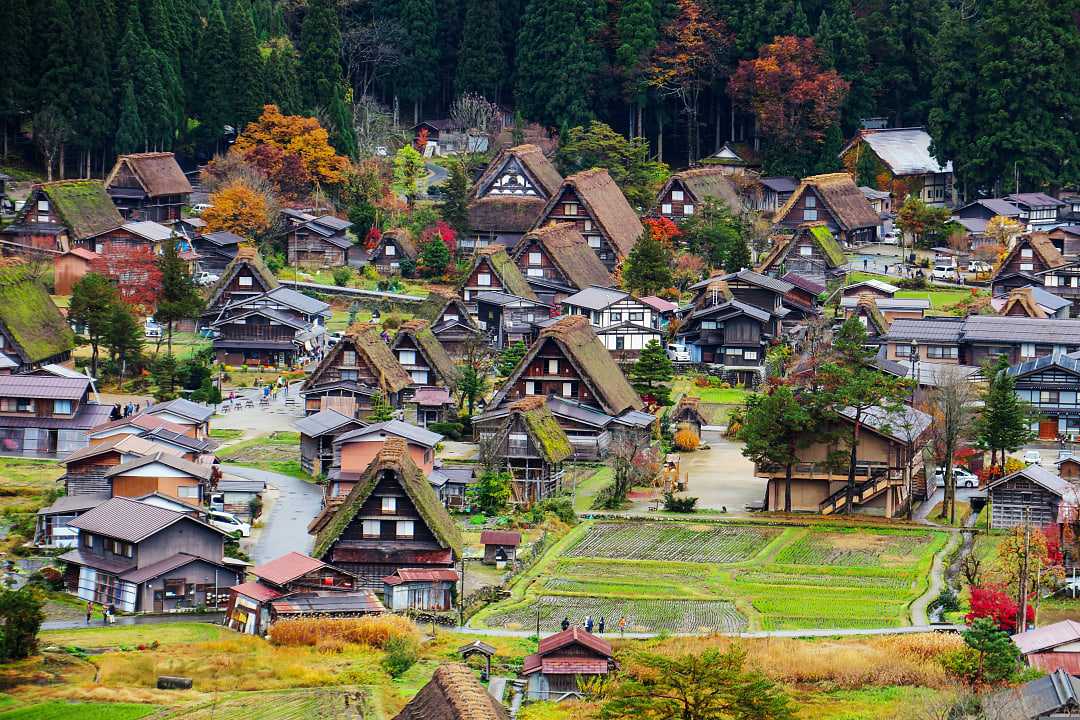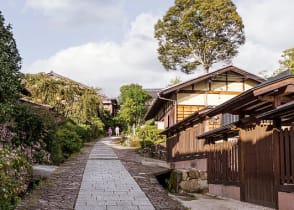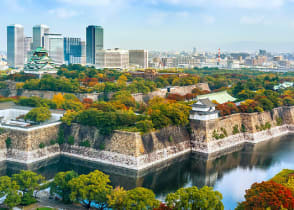12 Cute Towns in Japan to Visit

Shirakawa-go, Japan
Discover the enchanting allure of 12 cute towns in Japan.
From historic settlements lined with wooden merchant houses to remote mountain villages with towering thatched roofs, Japan's small towns offer an unparalleled journey into the country's cultural heartland. Wander the iconic bamboo groves of Arashiyama, inhale the scent of aged wood in Sawara's canal-side warehouses, or marvel at the ingenious architecture of Gokayama's gassho-zukuri farmhouses designed to withstand heavy snowfall.
Our curated list showcases 12 of Japan's most charming small towns to inspire your dream trip and help you enjoy the timeless traditions of the countryside.
1. Shirakawa-go

Traditional houses in Shirakawa-go, Japan
Shirakawa-go's gassho-zukuri houses, with their steep thatched roofs designed to withstand heavy snowfall, are an architectural marvel.
In winter, you can wander village streets blanketed in pristine snow and breathe in the earthy scent of the roofs. A number of the historic houses are over 250 years old and offer a glimpse into traditional rural life in Japan's mountainous regions.
The village's unique architecture has earned it a place on the UNESCO World Heritage list, making it a priceless destination for those interested in traditional Japanese culture. Step inside one of the houses to see the intricate wooden beams and experience the cozy warmth of the sunken hearth, known as an irori.
2. Tsumago

Tsumago post town, Japan
Tsumago was an important stop along the Nakasendō trail which connected Kyoto and historical Tokyo during the Edo period. The well-preserved architecture and smooth, worn cobblestones add to the ambiance of the car-free main street lined with wooden buildings that transport you back in time.
Hear the gentle clop of horses' hooves, reminiscent of the era when this was a bustling post town. The town's efforts to preserve its historic character have paid off, as Tsumago remains one of the best-preserved post towns along the Nakasendo trail. Explore the traditional inns and shops, or fully immerse yourself in the Edo-period atmosphere by staying overnight in one of the customary buildings.
3. Ine

Funaya houses in Ine, Japan
In the seaside town of Ine, funaya houses are built over the water, with spaces underneath for fishing boats. Gaze out over the Setonaikai sea from the wooden deck of a home, lulled by the gentle lapping of waves against the sturdy wooden pillars.
Each house offers a fascinating glimpse into the town's maritime heritage and the lives of generations of fishermen. Explore the narrow streets and alleys of Ine, where you can find charming cafés and restaurants serving seafood caught by the locals, its aromas filling the air as it grills over coals.
4. Narai

Gohei Mochi
Well-preserved machiya merchant houses bring to light Narai's historical significance along the Nakasendo trail. Trace the elegant curves of the traditional wooden buildings lining the historic streets. You can easily imagine the hustle and bustle of travelers and merchants passing through as you soak in the town's timeless charm.
Narai's efforts to preserve its historic character have earned it recognition as a nationally designated Preservation District for Groups of Traditional Buildings. Stop by one of the town's traditional confectioners to sample locally made sweets or experience a taste of the Edo period by sampling gohei-mochi, a skewered rice cake made from pounded sticky rice that’s coated in a sweet miso or walnut sauce and grilled.
5. Uchiko

Uchiko-za Kabuki Theater in Uchiko, Japan. Photo courtesy of JNTO
Uchiko's historic area has over 300 white-walled residences and storehouses dating back to the Edo period. Run your fingers along the washi paper lanterns illuminating the streets at night, casting a warm, inviting glow along the buildings and walkways.
These traditional buildings offer a glimpse into the town's rich cultural heritage, with some housing museums and galleries. Uchiko's commitment to preserving its historic architecture has earned it recognition as a UNESCO World Heritage Site, making it a must-visit destination for those interested in traditional Japanese culture. Explore the town's many art galleries and workshops, where you can see artisans practicing traditional crafts like making paper or candles.
6. Omori (Tokyo)

Yakitori
While Tokyo is known for its modern skyline, the neighborhood of Omori retains its small-town atmosphere, with shops selling traditional goods.
Enjoy the sizzle and smoky aroma of yakitori grilling over charcoal braziers for an immersive ambiance as you find the neighborhood a pleasant respite from the city's fast pace. As an introduction to Old Tokyo, you can explore the narrow streets lined with traditional shops selling everything from handmade wooden goods to seafood straight from the nearby Omori Nori market.
For a truly authentic experience, don't miss the chance to sip a steaming cup of green tea in a traditional teahouse tucked away in one of the quiet back lanes.
7. Arashiyama (Kyoto)

Arashiyama Bamboo Forest in Kyoto, Japan
Arashiyama's iconic bamboo grove is a natural wonder, with towering green canes creating a peaceful atmosphere.
Listen to the canes gently swaying and creaking in the wind as you walk the grove's paths, dappled in shifting shadows. The iconic scenery has been celebrated in art and literature for centuries, but also connects to the small-town feel of the neighborhood within the larger city.
The sound of running water from the nearby river adds to the calming ambiance, while glimpses of Kyoto's famous temples peek through the dense bamboo thickets. For a truly immersive experience, visit in the early morning or evening when you can practically have the grove to yourself.
8. Gokayama

Gassho-zukuri in Gokayama, Japan
Like the famed Shirakawa-go, Gokayama's gassho-zukuri villages feature huge thatched-roof farmhouses that have withstood the test of time. Marvel at the intricate patterns of the thick thatched roofs, ingeniously designed to shed heavy winter snowfall. Step inside one of these historic houses to experience the warm, rustic interiors and learn about the traditional way of life.
The villages of Gokayama offer a glimpse into Japan's rural past, with residents continuing to practice traditional arts and crafts. Explore the narrow walking trails that connect the villages, surrounded by lush mountain scenery.
9. Sawara

Sawara, Japan
The charming town of Sawara is defined by its picturesque warehouses that line the central canal. Inhale the rich scent of aged wood from these historic kura as you stroll along the canalside, watching boats gently drift by.
These former rice storehouses now house shops, restaurants, and museums, offering a glimpse into Sawara's merchant past. Take a leisurely boat tour along the canal for a different perspective of the architecture and daily life. In the evening, the warehouses are beautifully illuminated, creating a majestic ambiance.
10. Ainokura

Ainokura, Japan
Ainokura is one of the largest and best-preserved villages with iconic gassho-zukuri farmhouses in the Gokayama region. Witness the massive thatched roofs towering stories above you, their shaggy straw swaying in the mountain breeze.
Explore the narrow lanes to see these unique architectural marvels up close, imagining life in this remote mountain village. Ainokura's commitment to preserving its cultural heritage has earned it recognition as a UNESCO World Heritage Site, ensuring these historic houses will be protected for generations to come.
11. Tomonoura

Abuto Kannon Shrine near Tomonoura, Japan
The picturesque bay of Tomonoura is lined with traditional buildings and boats, creating a scene out of old Japan. Breathe in the fresh sea air mingled with the aroma of freshly caught fish at the lively morning markets. Stroll along the waterfront to admire the historic townscape that has remained largely unchanged for centuries.
For a unique experience, consider taking a boat tour around the bay or visiting the nearby Abuto Kannon shrine, which can only be reached by boat during high tide. Tomonoura's tranquil atmosphere invites you to slow down and savor the simple pleasures of coastal life.
12. Taketomi Island

Taketomi Island in Okinawa, Japan
On the tiny island of Taketomi, sandy streets are lined with traditional Okinawan houses featuring vibrant red-tiled roofs. Feel the warmth of the tropical sun and gentle ocean breeze as you cycle Taketomi's peaceful streets, taking in the island's relaxed pace of life.
The remote island offers a look into Okinawa's unique culture and architecture. Explore the island's beaches, where you can swim in crystal-clear waters or simply relax and soak up the atmosphere. Taketomi's famous handmade rice liquor, known as awamori, can introduce you to the celebrated flavors of the island before you enjoy locally caught seafood.
Explore Cute Towns in Japan During Your Trip

Ine, Japan. Photo courtesy of JNTO
Japan's small towns and villages immerse you in the country's rich cultural heritage and traditions. From iconic thatched-roof houses to waterfront settlements and picturesque island escapes, these destinations transport visitors back in time, allowing them to experience the timeless charms of old Japan.
For further inspiration to explore lesser-known treasures, things to do, the best time to visit, and more, find inspiration with our Japan travel guide or our customizable Japan tours.
Life-Enriching Travel Designed Just for You
- 1
Trips curated by the world’s top destination experts
- 2
Concierge-level service leading up to and during your trip
- 3
Unique, exclusive experiences and insider access





